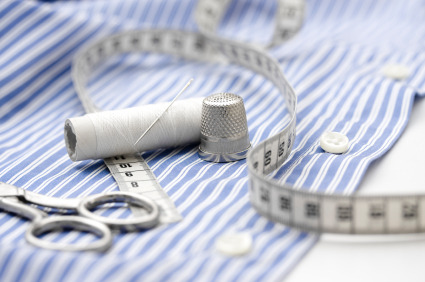
Mario writes us to ask: When you’re hunting for used quality clothing, you’re bound to come across pieces that are a couple of sizes too small or a few too big. Some of this, I assume, can be corrected with a visit to a tailor. If that’s the case, my question is: in your experience, what size range can be (relatively) easily retrofitted to your measurements?
It happens to all of us – we put our hand on a perfect garment in a thrift store. We pull it out, and it looks tremendous. We try it on, and it doesn’t quite fit. Immediately, we wonder: can it be altered?
Altering second-hand clothes is the same as altering new clothes. Some procedures are possible, some impossible. Some are easy, some difficult. Let’s take it by garment.
Shirts
- Shirt sleeves can be easily shortened, but usually they can’t be easily lengthened.
- Cuffs and collars can be replaced, but only with white (and it may be a bit expensive).
- The torso of a shirt can be brought in, and the sleeves slimmed, as in episode six of Put This On. Remove more than three or four inches and you may have a badly unbalanced shirt, depending on your shape.
- The collar button can be moved about a quarter inch either direction to make the collar larger or smaller, but this may throw off the balance of the collar. Your taste should guide you.
- The shoulders and chest of a shirt are largely inalterable.
Trousers
- The waist of a pair of trousers can be let in or taken out 2-3". Look inside the seat for extra fabric at the waistband – this, minus half an inch or so, is as far as you can take the pants out.
- Trousers are easily shortened, but lengthening them requires fabric at the hems. You should be able to turn the leg inside out to check how much room you have. Cuffs can also be removed for extra length.
- Be careful when lengthening as edge wear could leave an undesirable line when the pant is let out.
- Pleats can be removed, but you may not be happy with the result. Either they are replaced with darts, or the pants are substantially re-cut.
- Trousers can be slimmed or tapered from the bottom of the pockets down, from either the inside seam, outside seam or both.
Jackets
- Jacket waists and torsos can usually be altered by about 2", though 1" is generally safer.
- The top block of jackets – from the armholes up – is very difficult to alter. Don’t try.
- Shoulders must fit, if they don’t, put it back.
- Jacket sleeves can be taken up or down as long as the buttons are non-functional. To see how far they can be taken down, feel with your fingers inside the lining of the sleeve end for folded-back fabric. Usually there’s an inch or two, but remember that you will need to retain about half an inch to reach the lining on the inside.
- If jacket buttons are functional, the sleeve can be taken up from the shoulder, but this is a tricky and expensive process – budget $75 or so, and find a good tailor. It’s possible the sleeves can be taken down a bit, too, but you’d have to ask a tailor to look for extra fabric in the armhole.
- When lengthening sleeves from the cuff, you may find that there’s a line of wear, especially on textural fabrics like flannel.
- Vents cannot be added to or removed from jackets.
- Jacket lengths are alterable, but it’s inadvisable and expensive to try.
- Jacket lapels – same deal.
Shoes
- Shoes that are slightly too large (½ size or less) can sometimes be fit with insoles or tongue pads. This is particularly true if width is the problem, rather than length – just be careful that the ball of your foot hits in the appropriate flex point in the shoe.
- Shoes can be stretched, but only in width, not in length. Stretching can usually take a shoe about one width larger – say from D to E. Sometimes two, depends on the shoe.
Socks
- Socks are generally inalterable, but if you have notably large feet and are set on second-hand hosiery, try gluing two or more pairs of socks together, then putting both on your foot. I’ve never done it, but it seems like it might work.